We explain what Islam is, and discuss the pillars of faith on which this religion stands. In addition, we explore its characteristics, ceremonies, and more.
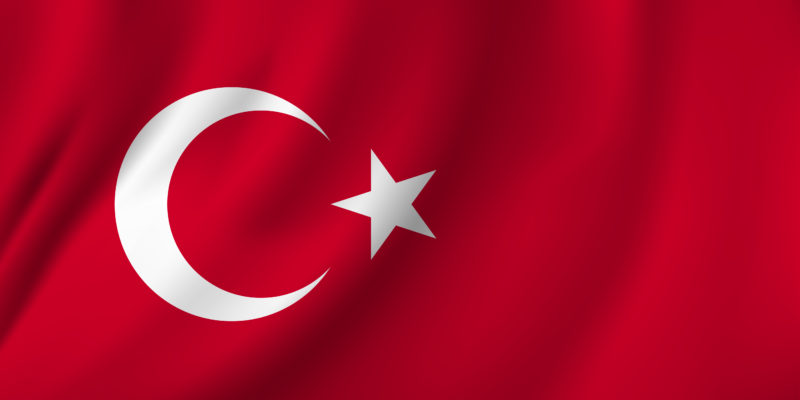
What is Islam?
Islam is a monotheistic religion that upholds the existence of a single god (Allah) and follows the teachings of the Prophet Muhammad. It is based on two main scriptures: the Qur'an, which contains the divine revelation and the fundamental principles of the religion, and the Tradition of the Prophet Muhammad, which narrates the life and teachings of the prophet.
Islam originated in the 7th century on the Arabian Peninsula, and is currently the second-largest religion in the world, with over 1.2 billion adherents. Islam encompasses various traditions, schools, sects and doctrines, and its followers belong to different societies, nations and ethnic groups.
The fundamental doctrine of Islamic faith establishes "the five pillars of Islam", which constitute the obligatory acts of worship for believers: profession of faith, prayer, almsgiving, fasting, and pilgrimage. In addition, there are guidelines and prohibitions that touch on every aspect of the social and individual lives of Muslims, such as the ban on certain foods and alcohol.
The lives of Muslims are also ruled by traditional practices, which though not doctrinal in origin, have become religious customs. Among them is the dress code establishing the use of the niqab (veil) for women.
Islam or Islamism? The terms Islam and Islamism are different in meaning. Islam is the religion preached by the prophet Mohammed and embraced by millions of followers. Islamism, on the other hand, is a heterogeneous political movement that emerged in the 20th century aiming to structure states based on Islamic law. Within the vast spectrum that makes up Islamism, there are fundamentalist terrorist groups that employ violence.
- See also: Islamism
Origin of Islam
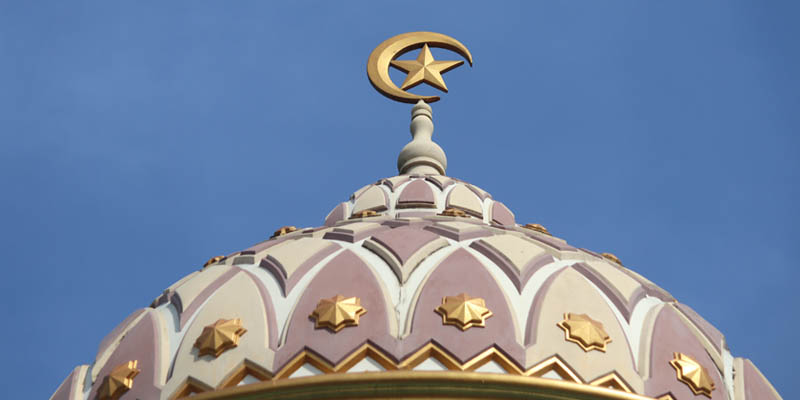
Islam originated in the 7th century on the Arabian Peninsula from the preaching of the Prophet Muhammad. Muhammad was born in Mecca, and at the age of 40, began to spread his revelation. He claimed to have received the word of Allah (the only God) and stated he was not the only prophet, but the last. He believed that Abraham, Moses, and Jesus were earlier prophets of the same God, but that he, Muhammad, had received the final revelation.
Due to his preaching, he was rejected in Mecca, which was the main urban center in the region. There, the Arabs practiced a polytheistic religion and worshiped their gods at the Kaaba, the city’s holy site. Muhammad migrated to Medina in 622 AD. This event is known as the Hijrah and is considered the starting point of the Muslim calendar.
In Medina, Muhammad's power and prestige grew, and most inhabitants converted to his teachings. Alongside his followers, he conquered several oases on the Arabian Peninsula and began to build a Muslim state. In 630, he invaded Mecca, subdued the city's authorities, and suppressed the old polytheistic worship. He died in Medina two years later.
Expansion of Islam
In many regions, the spread of Islam went hand in hand with the territorial expansion of Islamic states throughout history.
During Muhammad's lifetime, Islam came to comprise half of the Arabian Peninsula. In the period of the orthodox caliphate, the rest of the territories of the peninsula, Egypt, and the Anatolian region were conquered. Under the Umayyad dynasty, Islam encompassed the rest of North Africa, the European Iberian Peninsula, and expanded its territories in Asia Minor, establishing its capital in Damascus.
During the Abbasid dynasty, the capital was moved to Baghdad, and Islamic culture was greatly encouraged. However, with the territory being so vast, it was difficult to hold its unity. Following various internal divisions, the Mongol Empire, led by Genghis Khan, conquered the Abbasid caliphate. The introduction of Islam to Pakistan, India, and Bangladesh dates back to the 10th and 11th centuries.
From then onward, the heirs of the Mongol Empire became the principal disseminators of Islam. When this empire was divided, the Ottoman Turkish Empire emerged as the great Muslim state.
The spread of Islam in sub-Saharan Africa and Southeast Asia, in contrast, generally came about through peaceful means, conversion, and the teachings of Sufism.
Pillars of Islam
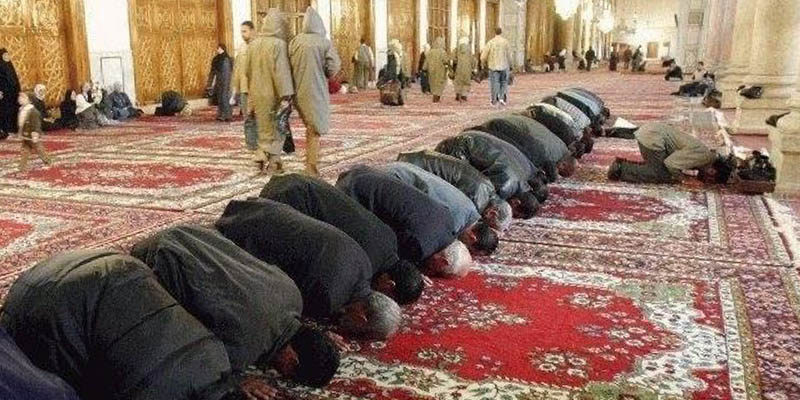
Islamic doctrine is based on the text of the Qur'an, also known as Quran or Koran. Among other things, it sets forth the so-called "Five Pillars of Islam", which establish the basic obligatory acts for Muslims.
- Shahada: Profession of Faith. The shahada is the assertion of Islamic faith, and consists of saying "There is no God but God and Muhammad is the Messenger of God".
- Salat: Prayer. Observant Muslims must pray five times a day. Prayers can be done in solitude in a private space, but on Fridays they must go to the mosque. Collective worship seeks to strengthen the spirit of the Muslim community.
- Sawm: Fasting. Islam followers that have reached puberty and are healthy in body and mind must fast during the month of Ramadan. Abstinence involves food and drink, tobacco, perfume and sexual activity, and lasts all day until nightfall. The purpose of this practice is to distance oneself from earthly passions in order to remain attentive to God.
- Zakat: Almsgiving. Adherents of Islam believe all goods have been granted by God, and must therefore be justified and purified. This is done through almsgiving, which provides aid to the poor, the destitute, widows and orphans. Almsgiving also provides the means to wage war against infidels (jihad).
- Hajj: Pilgrimage. The mandatory religious duty to go to Mecca once in a lifetime is for all adult Muslims who are physically in health and can afford to undertake the pilgrimage. Once in Mecca, the pilgrim must go to the Kaaba Mosque, where the so-called Black Stone (a sacred relic) is located.
Ceremonies
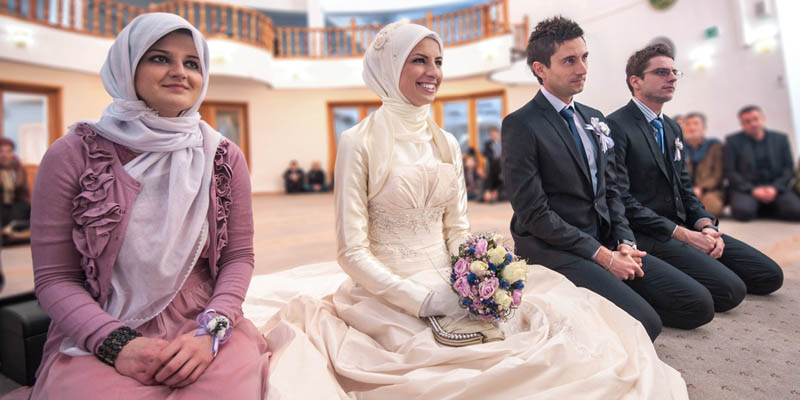
Important ceremonies for Islam are:
- Birth. Upon birth, the father whispers the "call to prayer" into the child's ear. He then places a bit of honey on the child's tongue. Through this ritual, the child becomes a Muslim. A week after birth, an "aqiqah" ceremony is held, whereby the newborn is given a name.
- Marriage. While in traditional Islam the groom is suggested by the parents, the prospective spouse may refuse the proposal if they wish. As for the marriage ritual, the ceremony requires the presence of at least two witnesses. The wedding can take place at the home of one of the spouses or in the mosque. Both the groom and bride must kneel before the imam (who conducts the ceremony) to declare that they are getting married of their own free will.
- Death. If the person knows they are going to die, they must recite the "shahada"; however, if the person is unable, those present must recite it in their place. The body of the deceased must be washed with water by individuals of the same gender as the deceased and must be wrapped in the "kafan," the sacred white shroud, before being finally taken to the mosque.
Sacred texts of Islam
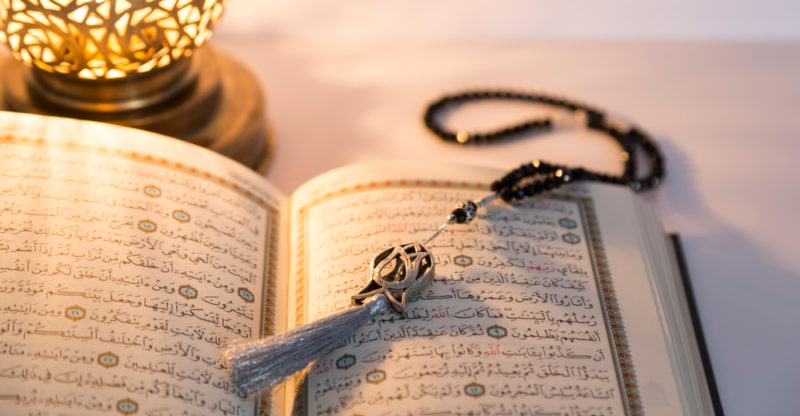
The two most important texts of Islam are the Qur'an and the Sunnah.
Muslims consider the Qur'an to be a faithful reflection of the word of Allah as revealed to Muhammad. The oldest remains of the text suggest that the formulation of the dogma took place between the 7th and 9th centuries. This book laid the groundwork for Muslim rites, law, and theology.
However, not all aspects of the Muslim religion and law are revealed in the Qur'an. For that, Muslims from generations following Muhammad studied the prophet's behavior and wrote accounts relating his exemplary life. The compilation of these texts is the Sunnah, also known as the Tradition of the Prophet Muhammad, which is composed of various hadiths or accounts. Each Islamic tradition recognizes different hadiths as valid.
Sharia
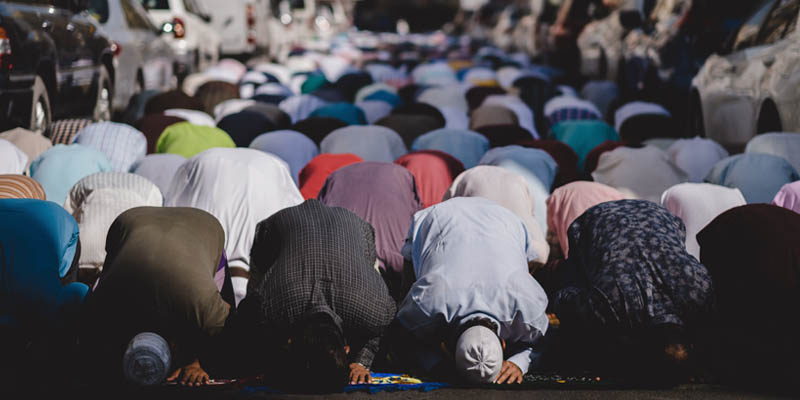
Sharia is commonly known as "Islamic law". It is a text crafted by Muslim scholars between the 7th and 9th centuries, whose aim was to address life situations not covered in the Qur'an.
However, it is worth pointing out that the Sharia is not a legal code stating legal duties, but rather a code of behavior that outlines the path of conduct for individuals and communities to grow closer to God. The Sharia sets forth the morals of Islam and details what is permitted and what is forbidden. Muslims believe that the Sharia establishes norms that remain unchanged over time or cultural context, because they are part of the truth revealed by Allah.
The text includes a section dedicated to acts of divine worship and the daily order, defining purification rituals, prayer, fasting, charity, and other matters related to the pillars of Islam.
In addition, it contains another section devoted to guiding human and communal interactions, such as the regulation of transactions, marriage and divorce laws, parental responsibilities, food, matters of war and peace, as well as what constitutes a crime and its punishments.
Jihad
Jihad is an elusive concept, since it has been subject to different interpretations within Islamic traditions. It is an Arabic term that literally means "effort" but is often translated as "holy war". Jihad is a precept that imposes the defense of faith on the Muslim community.
There are two basic interpretations within Islam as to what this obligation means.
One stream interprets jihad as the holy war of Muslims against infidels, and considers this obligation as the sixth pillar of Islamic faith. In this sense, this stream holds that it is a duty every believer must fulfill to some extent.
On the other hand, a second stream considers that jihad does not have a warlike meaning, but rather refers to the effort to overcome difficulties. In this sense, violence is only justified in cases of defense of the community and the survival of Islam.
Today, Muslim countries are ruled by international law, and the warlike interpretation of jihad has lost much relevance. Modern Muslim political movements put an emphasis on the spiritual interpretation. However, the tradition of jihad as violent imposition on infidels has been taken up by some radical fundamentalist Islamist political groups.
Traditions of Islam
There are various traditions within Islam that have contrasting interpretations of the revelations of the Qur'an and, especially, of the teachings of Muhammad. The main branches of Islam diverged during the 7th and 8th centuries. Upon Muhammad's death, disputes ensued over who should become his successor, both politically and religiously.
The Sunnis proposed following the law of the prophet, and held that the next-in-line should be the one who would best govern the country. The Shiites, in contrast, upheld that the successor should be a member of the prophet's family.
Initially, this division had only political features. However, theological and cultural differences developed over time.
Sunnis
The Sunni branch prevailed and currently accounts for about 80% of the ummah (Muslim community). It comprises various schools that differ in the way they carry out certain precepts and obligations of the Islamic faith.
Sunnis accept the legitimacy of the first four successors of Muhammad (Abu Bakr, Omar, Osman, and Ali) and consider that the other currents of Islam have introduced innovations that deviate from Muslim belief.
Shiites
The Shiite tradition makes up about 10% of the ummah today. Throughout history, the Shiites have made several attempts to assert themselves, but have most often constituted a minority in Sunni-majority environments.
Shiites believe that the succession of Islamic leadership should be hereditary and passed down to male descendants of Muhammad (through his daughter Fatima and her husband Ali). These descendants, known as "imams", are believed to be inspired by the prophet and are infallible interpreters of the divine will. They must therefore serve as religious and political leaders.
Sufis
Another great tradition of Islam is Sufism, also known as Islamic mysticism. This branch of Islam emphasizes the spiritual aspect of the religion and holds that God must be found in the heart of every Muslim.
Sufis embrace asceticism and preach love, holiness, and gnosis. They are organized into brotherhoods and, in addition to participating in mosque worship, they have their own prayers and rites. Their worship ceremonies include singing and, in some brotherhoods, dancing.
Women in Islam
There is much controversy regarding the role of women in Muslim societies, which is viewed as demeaning and unjust. Islam is therefore often regarded as a religion rooted in female subordination.
On the other hand, some point out that gender inequality is not dictated by Islamic law, but originated in patriarchal cultural practices that certain Muslim societies adopted throughout history.
In this regard, it is important to highlight the great heterogeneity that exists within the Muslim world. Some countries, like Saudi Arabia, regard women as second-class citizens and even have laws stipulating gender inequality; for example, women cannot vote in some electoral processes or drive vehicles. In other countries, a woman's testimony is less valid than that of a man. Nevertheless, these customs do not trace back to the origin of Islam or the political practices during Muhammad's time.
In contrast, other countries do not limit women's freedoms in this manner. For example, there have been more female heads of state and government in Muslim countries such as Pakistan, Bangladesh, or Indonesia than in non-Islamic, western liberal countries like the United States, France, or the United Kingdom.
In fact, there is an important stream within feminism known as Islamic feminism, which is concerned with spreading Islam on a gender-equal and socially just basis.
Islam today
Today, Islam has over 1.6 billion adherents, which account for 23% of the world's population and constitute a community spanning more than 200 countries.
The countries with the largest Islamic population are:
- Indonesia (188,619,000)
- Pakistan (144,788,000)
- India (131,213,000)
- Bangladesh (118,512,000)
- Turkey (67,864,000)
- Iran (67,610,000)
- Egypt (64,647,000)
- Nigeria (54,891,000)
- Algeria (31,729,000)
- Morocco (31,642,000)
The Islamic population is currently on the rise. This is due to the high birth rate in Muslim countries, and a religious revival that began in the 1970s.
The rise in Islamic faith emerged as a reaction to the process of Westernization experienced by Muslim countries. Against the backdrop of poverty and war, there is a return to an idealized community with a new legal order capable of improving the living conditions of its inhabitants.
Islamism
In the context of the growth of Islam, Islamism emerged: a current within Islam that seeks to transform the political structure of Muslim countries to bring about a positive change in society. Islamism holds that in order to achieve this, it is essential that the new order be based on the sharia (the Islamic law that establishes religious principles).
Islamism is not a homogeneous movement, but an ideology advocated by very diverse groups.
Most of these political groups aim to transform society through religious education, and their political actions are channeled through democratic means.
The most prominent Islamist organizations include:
- Muslim Brotherhood (Egypt and Jordan)
- Islamic Salvation Front (Algeria)
- Renaissance Party (Tunisia)
- Jamaat-e-Islami (Pakistan)
- Nahdlatul Ulama and Muhammadiyah (Indonesia)
- Hamas (Palestine)
- Hezbollah (Lebanon)
Terrorism
Islamic fundamentalism is heterogeneous. Broadly speaking, fundamentalists believe that most current Islamic societies are in a stage of ignorance, termed jahiliyyah. They consider this caused by the fact that they are governed by man-made laws rather than divine law.
Furthermore, they believe that today's political systems are rooted in ideologies contrary to religion, with values centered on materialism, consumerism, and immediate gratification. Against this backdrop, the goal of Islamic fundamentalists is the creation of an Islamic state.
There are some radical groups within fundamentalist groups that resort to violence. Among them are Al-Qaeda and Osama bin Laden, responsible for the terrorist attacks against the Twin Towers and the Pentagon (2001), Madrid (2004), London (2005), and other cities, some in Muslim-majority countries.
It is worth pointing out that these terrorist groups do not represent the broader Islamist movement, which, for the most part, does not use violence to achieve its objectives and acts within the legal and democratic political framework.
Explore next:
References
- Fierro Bello, M. I. (1997). Islamismo. Scripta Fulgentina: revista de teología y humanidades, 7(13), 81-93.
- Fierro Bello, M. I. (2002). ¿Qué es el islam?. Real Sociedad Económica Matritense de Amigos del País.
- Flaquer, J. (2004). El Islam: descripción actual, dimensíón mundial, movimientos islámicos. EGUZKILORE, N° 18.Tamayo-Acosta, J. J. (2009). Islam: cultura, religión y política. Ed. Trotta
Was this information useful to you?
Yes NoThank you for visiting us :)